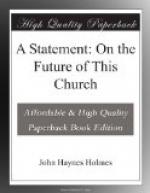In order to make plain the situation, as it has presented itself to my mind during the last five weeks, I must turn to the past for a moment, and bring to you therefrom some fragments of autobiography. Those of you who were present at the meeting on last Monday night, have already heard what I am about to say. I beg your undivided attention, none the less, that you may note the bearing of this recital not on a problem presented, as then, but on a decision made, as now.
I entered the Unitarian ministry in the year 1904, [5] under the influence of motives not unfamiliar. In the first place, I saw the pulpit. I went into the ministry for the same primary reason which has held me there through all these years gone by—a desire to preach. I think I can say, in no spirit of boasting, that from my earliest days I have had an intense interest in the problem of truth, and a passion to interpret and defend by the spoken word, the truth as I saw it, to other men. It is just this passion, I suppose, which makes the preacher, as distinguished from the poet or the scientist. So Phillip Brooks would seem to suggest in his famous dictum, that preaching is “Truth (conveyed) through Personality.” Furthermore, the truth which I desired to expound was theological in its nature. My whole approach to the problem was along the lines of speculation in the field of religious, as distinguished from political or social, thought. God, the soul, immortality, the origin and destiny of man, sin and salvation—these were the questions that held me, even as a boy, partly, I suppose, because of native inclination, partly because of careful training in a Unitarian home and church, mostly I am convinced because I early came under the spell of that prince of liberal preachers, Dr. Minot J. Savage. To do what Dr. Savage was doing each Sunday, preaching to eager throngs the great truths of the Unitarian gospel—this became the consuming ambition of my life. I wanted to stand in a pulpit and preach. I decided to do so; and if judgment in such a question can be based on experiences of inward joy, I am ready to testify that my decision was not unwise.




